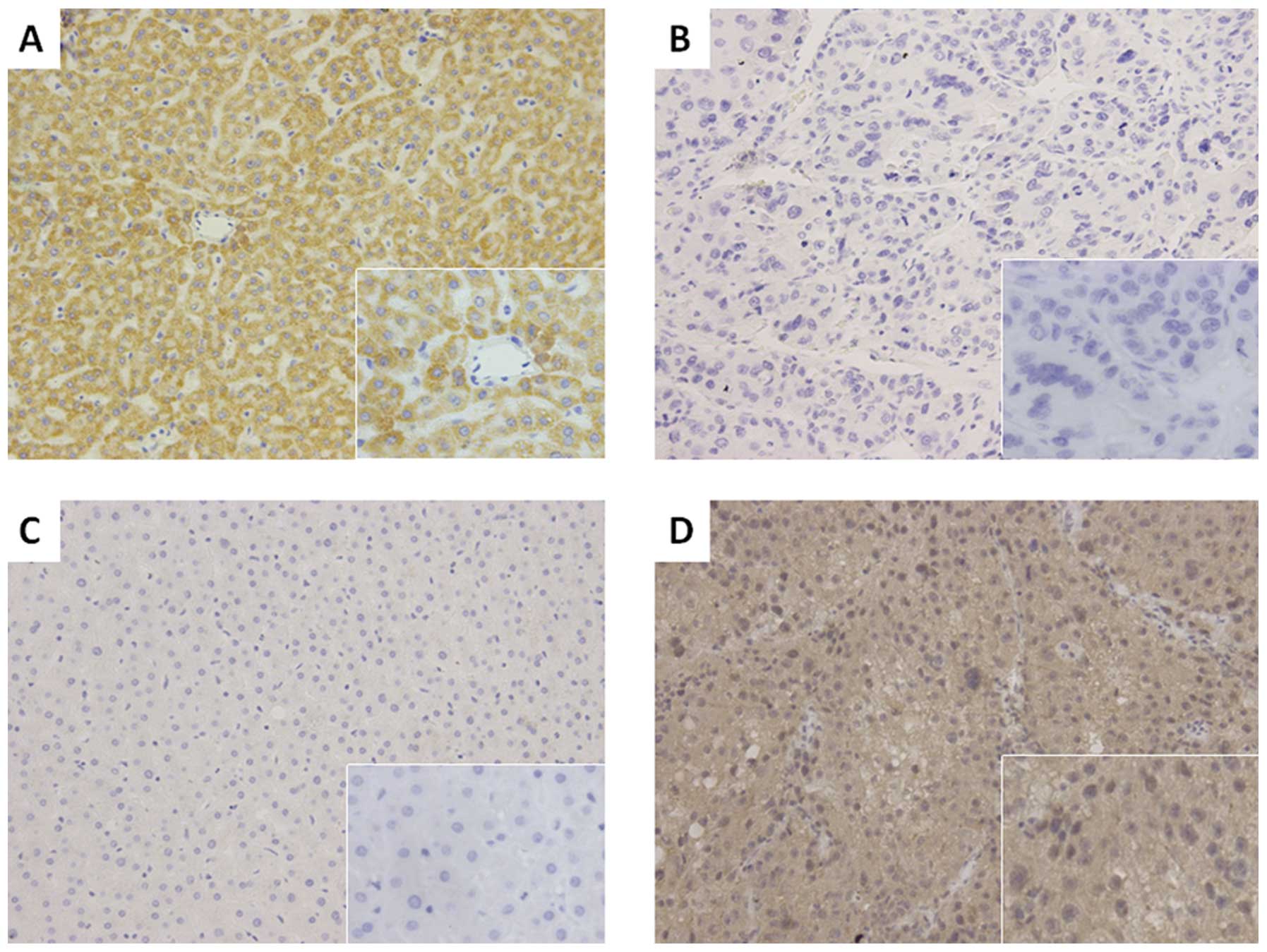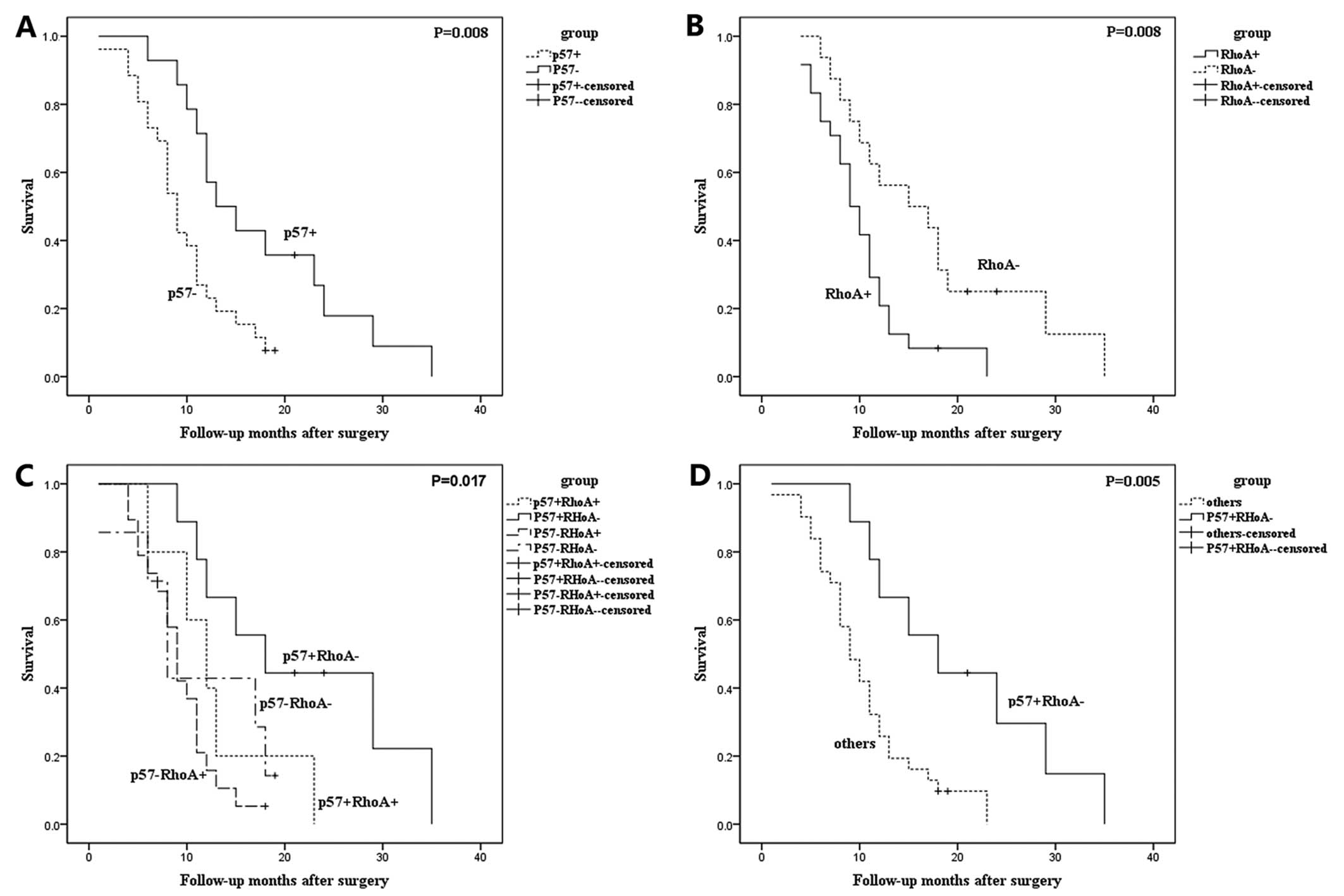|
1
|
Jemal A, Bray F, Center MM, Ferlay J, Ward
E and Forman D: Global cancer statistics. CA Cancer J Clin.
61:69–90. 2011. View Article : Google Scholar
|
|
2
|
Pateras IS, Apostolopoulou K, Niforou K,
Kotsinas A and Gorgoulis VG: p57KIP2: ‘Kip’ing the cell
under control. Mol Cancer Res. 7:1902–1919. 2009.
|
|
3
|
Guo H, Lv Y, Tian T, Hu TH, Wang WJ, Sui
X, Jiang L, Ruan ZP and Nan KJ: Downregulation of p57 accelerates
the growth and invasion of hepatocellular carcinoma.
Carcinogenesis. 32:1897–1904. 2011. View Article : Google Scholar : PubMed/NCBI
|
|
4
|
Lee MH, Reynisdóttir I and Massagué J:
Cloning of p57KIP2, a cyclin-dependent kinase inhibitor
with unique domain structure and tissue distribution. Genes Dev.
9:639–649. 1995.
|
|
5
|
Malik K and Brown KW: Epigenetic gene
deregulation in cancer. Br J Cancer. 83:1583–1588. 2000. View Article : Google Scholar : PubMed/NCBI
|
|
6
|
Lee MH and Yang HY: Negative regulators of
cyclin-dependent kinases and their roles in cancers. Cell Mol Life
Sci. 58:1907–1922. 2001. View Article : Google Scholar : PubMed/NCBI
|
|
7
|
Lee SH, Lee JK, Jin SM, Lee KC, Sohn JH,
Chae SW and Kim DH: Expression of cell-cycle regulators (cyclin D1,
cyclin E, p27kip1, p57kip2) in papillary
thyroid carcinoma. Otolaryngol Head Neck Surg. 142:332–337. 2010.
View Article : Google Scholar : PubMed/NCBI
|
|
8
|
Larson PS, Schlechter BL, King CL, Yang Q,
Glass CN, Mack C, Pistey R, de Las Morenas A and Rosenberg CL:
CDKN1C/p57kip2 is a candidate tumor suppressor
gene in human breast cancer. BMC Cancer. 8:682008. View Article : Google Scholar
|
|
9
|
Li JQ, Wu F, Usuki H, Kubo A, Masaki T,
Fujita J, Bandoh S, Saoo K, Takeuchi H, Kuriyama S, Ishida T and
Imaida K: Loss of p57KIP2 is associated with colorectal
carcinogenesis. Int J Oncol. 23:1537–1543. 2003.
|
|
10
|
Jin RJ, Lho Y, Wang Y, Ao M, Revelo MP,
Hayward SW, Wills ML, Logan SK, Zhang P and Matusik RJ:
Down-regulation of p57Kip2 induces prostate cancer in
the mouse. Cancer Res. 68:3601–3608. 2008.PubMed/NCBI
|
|
11
|
Schwarze SR, Shi Y, Fu VX, Watson PA and
Jarrard DF: Role of cyclin-dependent kinase inhibitors in the
growth arrest at senescence in human prostate epithelial and
uroepithelial cells. Oncogene. 20:8184–8192. 2001. View Article : Google Scholar : PubMed/NCBI
|
|
12
|
Yan Y, Frisén J, Lee MH, Massagué J and
Barbacid M: Ablation of the CDK inhibitor p57Kip2 results in
increased apoptosis and delayed differentiation during mouse
development. Genes Dev. 11:973–983. 1997. View Article : Google Scholar : PubMed/NCBI
|
|
13
|
Zhang P, Liégeois NJ, Wong C, Finegold M,
Hou H, Thompson JC, Silverman A, Harper JW, DePinho RA and Elledge
SJ: Altered cell differentiation and proliferation in mice lacking
p57KIP2 indicates a role in Beckwith-Wiedemann syndrome.
Nature. 387:151–158. 1997. View
Article : Google Scholar : PubMed/NCBI
|
|
14
|
Besson A, Assoian RK and Roberts JM:
Regulation of the cytoskeleton: an oncogenic function for CDK
inhibitors? Nat Rev Cancer. 4:948–955. 2004. View Article : Google Scholar : PubMed/NCBI
|
|
15
|
Guo H, Tian T, Nan K and Wang W: p57: A
multifunctional protein in cancer (Review). Int J Oncol.
36:1321–1329. 2010.PubMed/NCBI
|
|
16
|
Ridley AJ, Schwartz MA, Burridge K, Firtel
RA, Ginsberg MH, Borisy G, Parsons JT and Horwitz AR: Cell
migration: integrating signals from front to back. Science.
302:1704–1709. 2003. View Article : Google Scholar : PubMed/NCBI
|
|
17
|
Aspenström P, Fransson A and Saras J: Rho
GTPases have diverse effects on the organization of the actin
filament system. Biochem J. 377:327–337. 2004.PubMed/NCBI
|
|
18
|
Ridley AJ and Hall A: The small
GTP-binding protein rho regulates the assembly of focal adhesions
and actin stress fibers in response to growth factors. Cell.
70:389–399. 1992. View Article : Google Scholar : PubMed/NCBI
|
|
19
|
Etienne-Manneville S and Hall A: Rho
GTPases in cell biology. Nature. 420:629–635. 2002. View Article : Google Scholar
|
|
20
|
Gómez del Pulgar T, Benitah SA, Valerón
PF, Espina C and Lacal JC: Rho GTPase expression in tumourigenesis:
evidence for a significant link. Bioessays. 27:602–613.
2005.PubMed/NCBI
|
|
21
|
Pan Y, Bi F, Liu N, Xue Y, Yao X, Zheng Y
and Fan D: Expression of seven main Rho family members in gastric
carcinoma. Biochem Biophys Res Commun. 315:686–691. 2004.
View Article : Google Scholar : PubMed/NCBI
|
|
22
|
Wong CC, Wong CM, Au SL and Ng IO:
RhoGTPases and Rho-effectors in hepatocellular carcinoma
metastasis: ROCK N’Rho move it. Liver Int. 30:642–656.
2010.PubMed/NCBI
|
|
23
|
Pillé JY, Denoyelle C, Varet J, Bertrand
JR, Soria J, Opolon P, Lu H, Pritchard LL, Vannier JP, Malvy C,
Soria C and Li H: Anti-RhoA and anti-RhoC siRNAs inhibit the
proliferation and invasiveness of MDA-MB-231 breast cancer cells in
vitro and in vivo. Mol Ther. 11:267–274. 2005.PubMed/NCBI
|
|
24
|
Fritz G, Just I and Kaina B: Rho GTPases
are over-expressed in human tumors. Int J Cancer. 81:682–687. 1999.
View Article : Google Scholar : PubMed/NCBI
|
|
25
|
Lee S and Helfman DM: Cytoplasmic
p21Cip1 is involved in Ras-induced inhibition of the
ROCK/LIMK/cofilin pathway. J Biol Chem. 279:1885–1891. 2004.
|
|
26
|
Wang XQ, Lui EL, Cai Q, Ching WY, Liu KS,
Poon RT and Fan ST: p27Kip1 promotes migration of
metastatic hepatocellular carcinoma cells. Tumour Biol. 29:217–223.
2008.
|
|
27
|
Larrea MD, Hong F, Wander SA, da Silva TG,
Helfman D, Lannigan D, Smith JA and Slingerland JM: RSK1 drives
p27Kip1 phosphorylation at T198 to promote RhoA
inhibition and increase cell motility. Proc Natl Acad Sci USA.
106:9268–9273. 2009.PubMed/NCBI
|
|
28
|
Croft DR and Olson MF: The Rho GTPase
effector ROCK regulates cyclin A, cyclin D1, and p27Kip1
levels by distinct mechanisms. Mol Cell Biol. 26:4612–4627. 2006.
View Article : Google Scholar : PubMed/NCBI
|
|
29
|
Lai JM, Wu S, Huang DY and Chang ZF:
Cytosolic retention of phosphorylated extracellular
signal-regulated kinase and a Rho-associated kinase-mediated signal
impair expression of p21Cip1/Waf1 in phorbol
12-myristate-13-acetate-induced apoptotic cells. Mol Cell Biol.
22:7581–7592. 2002. View Article : Google Scholar
|
|
30
|
Mammoto A, Huang S, Moore K, Oh P and
Ingber DE: Role of RhoA, mDia, and ROCK in cell shape-dependent
control of the Skp2-p27kip1 pathway and the
G1/S transition. J Biol Chem. 279:26323–26330. 2004.
View Article : Google Scholar : PubMed/NCBI
|
|
31
|
Sahai E, Ishizaki T, Narumiya S and
Treisman R: Transformation mediated by RhoA requires activity of
ROCK kinases. Curr Biol. 9:136–145. 1999. View Article : Google Scholar : PubMed/NCBI
|
|
32
|
Sahai E, Olson MF and Marshall CJ:
Cross-talk between Ras and Rho signalling pathways in
transformation favours proliferation and increased motility. EMBO
J. 20:755–766. 2001. View Article : Google Scholar : PubMed/NCBI
|
|
33
|
Zhang S, Tang Q, Xu F, Xue Y, Zhen Z, Deng
Y, Liu M, Chen J, Liu S, Qiu M, Liao Z, Li Z, Luo D, Shi F, Zheng Y
and Bi F: RhoA regulates G1-S progression of gastric
cancer cells by modulation of multiple INK4 family tumor
suppressors. Mol Cancer Res. 7:570–580. 2009.PubMed/NCBI
|
|
34
|
Fan GK, Xu F, Yang B and Fujieda S:
p57kip2 expression is related to carcinogenesis and
tumor progression in laryngeal tissues. Acta Otolaryngol.
126:301–305. 2006.
|
|
35
|
Biaoxue R, Xiguang C, Hua L, Hui M,
Shuanying Y, Wei Z, Wenli S and Jie D: Decreased expression of
decorin and p57(KIP2) correlates with poor survival and lymphatic
metastasis in lung cancer patients. Int J Biol Markers. 26:9–21.
2011. View Article : Google Scholar : PubMed/NCBI
|
|
36
|
Ma L, Liu YP, Geng CZ, Wang XL, Wang YJ
and Zhang XH: Overexpression of RhoA is associated with progression
in invasive breast duct carcinoma. Breast J. 16:105–107. 2010.
View Article : Google Scholar : PubMed/NCBI
|

















